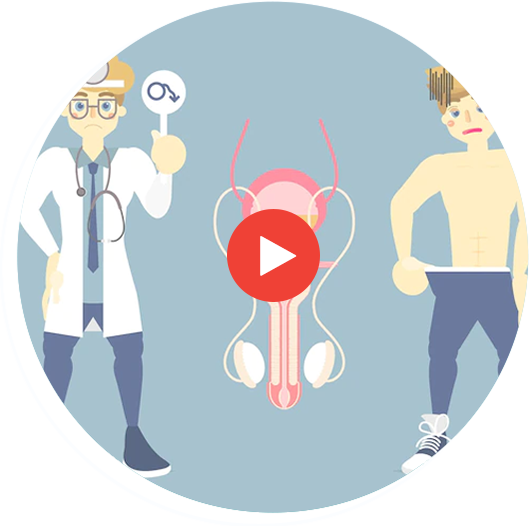
TELMDCARE
What is Erectile
Dysfunction?
In medical terms, erectile dysfunction or impotence is generally described as the inability to get and keep a penis erect or firm enough for sexual intercourse.
Suffering from erection issues every once in a while is not really a cause for concern as it can be due to stress and other factors like lack of self-confidence and the pressure to perform well in bed. However, if erectile dysfunction continues to persist, cause stress, affect your mental health, relationship and self-esteem, you might need professional help.
The inability to grow or keep an erection can also signify underlying health issues and conditions that need to be treated before they spiral out of control and increase your health risks for heart diseases.
If you have erectile dysfunction, there’s nothing to be ashamed of or embarrassed about. Seek a doctor’s help, and they’ll be able to assess your situation and provide a diagnosis and suitable treatments and medications based on your case.
Sometimes, treating the underlying issues and conditions can also positively affect your erection issues, while in other cases, you might need treatments and medication to resolve your erectile dysfunction.
Book an Appointment for Only
TELMDCARE
Is covered by many popular
insurance plans

TELMDCARE
Symptoms of erectile dysfunction
Now that we’ve thoroughly discussed what erectile dysfunction is, here are some of the most common symptoms you need to look out for and seek medical help if they continue to persist.
- Trouble or inability to get an erection
- Trouble or inability to keep an erection during or for sexual intercourse
- Decreasing sexual desire and drive
Everyone doesn’t need to suffer the same symptoms or to the same level. Still, if either of these problems affects your mental health and relationships, you should look into getting help before the issue affects your body. If you experience any of these symptoms, talk to our virtual doctor for erectile dysfunction treatment right away!
Causes of erectile
dysfunction
Like women, male sexual arousal is a highly complex process involving your hormones, brain, emotions, nerves, muscles, and blood vessels. Problems with either of these parts of the body can lead to erectile dysfunction.
Psychological causes of
erectile dysfunction
When it comes to sexual desires, your brain plays a highly crucial role in triggering a series of physical responses and events that cause an erection and get you feeling excited about sexual intercourse and activity.
TELMDCARE
As Seen On

TELMDCARE
How to Prevent Erectile Dysfunction
There are many ways you can avoid erectile dysfunction, but nothing beats the effectiveness and efficacy of making healthy choices and living a healthy, active life. Get regular checkups for heart conditions, diabetes, and other chronic health conditions, especially as you age.
Avoid using drugs, drinking, and smoking as much as you can, relax and take a breather to reduce stress and anxiety, and lastly, get help for your mental health issues.
Diagnosis of Erectile Dysfunction
The ED diagnosis begins with questions about vascular health, erection problem and your heart health. The healthcare may also physically examine, refer to a Urologist or order lab tests. The diagnosis determines the type of treatment you will need. Healthcare providers also inquire about your lifestyle and health history. It is important to share all the facts including any substance misuse, drug intake, alcohol and smoking problems. Doctors also ask questions about your mental health such as any stressors. The key to getting the right treatment is to be honest with your care provider so they can find the best treatment option for you.
Questions You Should Expect During Virtual Diagnosis
Our virtual doctor for erectile dysfunction may ask the following questions:
- Do you take recreational drugs?
- How much do you smoke or drink?
- What supplements, prescription drugs and over-the-counter medicines do you take?
- Do you have other untreated and treated health conditions?
- Do you experience problems when urinating?
- Have you undergone any radiation therapy or surgery in the pelvic area?
Besides questions about your health, the doctor will inquire about your ED problem. This helps determine whether the underlying problem is due to your erection function, orgasm, desire for sex or ejaculation. These may seem embarrassing and private but it helps find the root cause and thus, the right treatment.
What Constitutes An ED Physical Exam
A physical exam for ED assesses overall health. Besides your genitals, the doctor may also examine age-based risk factors such as blood pressure, heart health and peripheral pulses. Thedoctor may also examine the rectum. These tests aren’t harmful or painful.

TELMEDCARE
What we treat
We treat a variety of acute and chronic conditions and provide expert medical advice and guidance for our patients.
Read More
Medication services available 24/7 for adults and kids (3+)
Top quality, board-certified doctors
No insurance needed
Same-day prescriptions available*
*Prescriptions provided at doctor’s discretion.

Seek professionalHelp and Get Treatment
Erectile Dysfunction Online at TelMDCare
If you’re suffering from erectile dysfunction, there’s no need to be embarrassed or suffer in silence. At TelMDCare, we care about your health just as much as you do and offer our services to help you live a better, healthy, and fulfilled life.
You can sign up today, book an appointment with one of our qualified, expert doctors and seek treatments for all your ailments. We charge $43 per consultation with a free follow-up, ensuring you get quality and reliable health care at an affordable rate.
So what’re you waiting for? Sign up today and take advantage of our convenient and affordable services today!
TELMDCARE
Sign Up
Our best online doctors on call ensure that the services we provide are adequate, high quality,
and affordable.
Get in touch with us today for more details or Sign Up for a quick consultation.
$43 SIGN UP
TELMDCARE
FAQs
Not necessarily; just because you’re getting older, it doesn’t mean you’re sure to suffer from erectile dysfunction. However, your declining health, bad eating, and drinking habits can undoubtedly play a vital role. Furthermore, there’s no denying as you age, you’ll need a lot more direct touch and stimulation to achieve an erection, but if done right, you should be able to get one and enjoy a healthy sexual life.
If you’re experiencing a decreasing sexual desire, have constant issues achieving erections, orother sexual problems such as delayed or premature ejaculation, you should seek professional help and get treatment. You should also consider getting treatments and medication for your underlying health issues like diabetes, heart disease, or another known health condition that might cause erectile dysfunction.
You know what they say, prevention is better than cure, which is certainly true for many health-related issues especially, erectile dysfunction. If you want to avoid any sex or erection-related problems later down the road, start by living a healthy and active life. Furthermore, exercise regularly, maintain a healthy diet, avoid smoking, drinking, and drugs, maintain a healthy body weight, keep your cholesterol and blood pressure levels in check to prevent erectile dysfunction.
Generally speaking, both impotence and erectile dysfunction are often used interchangeably. However, there are significant differences in terms of the connotations they both carry. On the one hand, erectile dysfunction is used to describe a range of penis conditions, such as the occasional inability to get or keep an erection to a mild degree or failure to maintain and achieve an erection. On the other hand, impotence is a much more persistent condition and refers to a complete inability to get an erection. Both issues are related to erection and the inability to maintain one, but one is considered more long-termed than the other.



